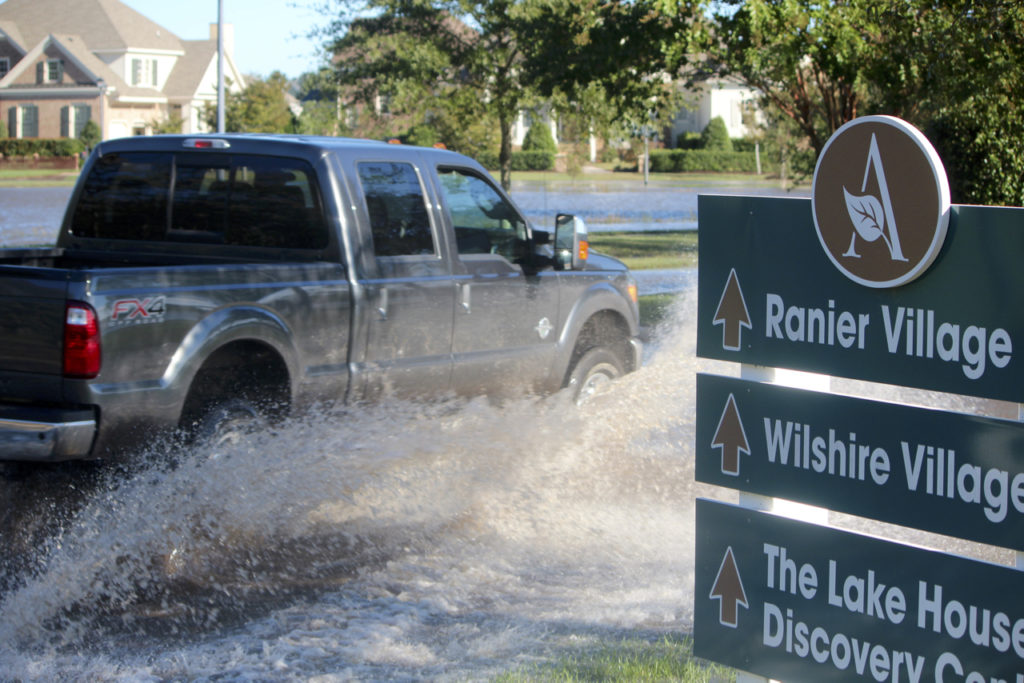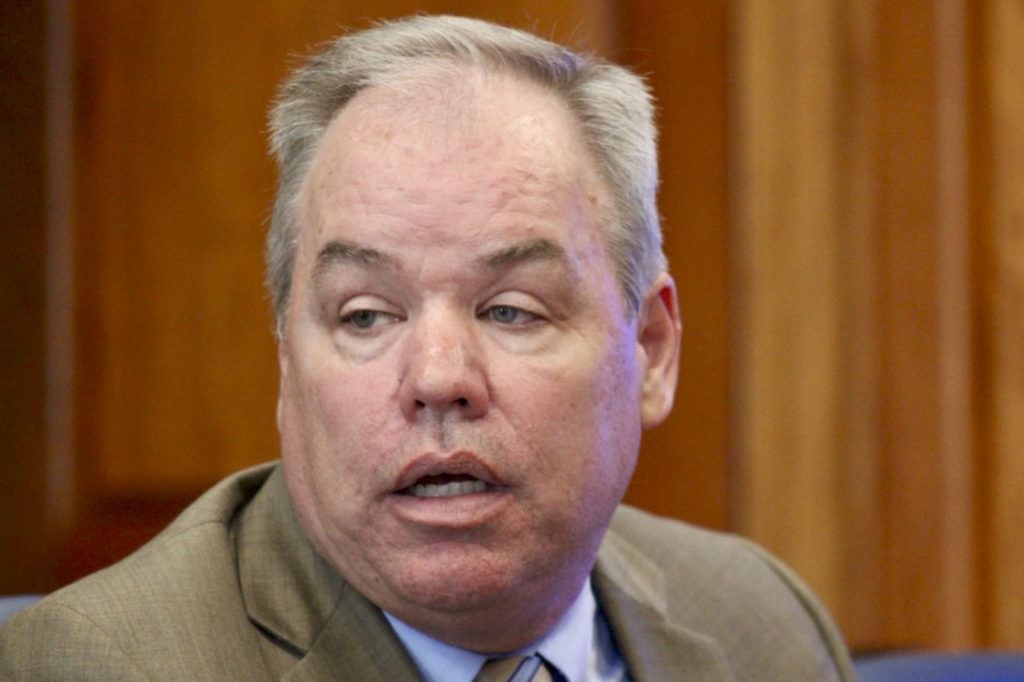
COURTHOUSE – Virginia Beach City Manager Dave Hansen on Tuesday, March 28, unveiled a spending plan that would raise real estate taxes to help establish full-day kindergarten throughout the city while redirecting money from a previous property tax rate hike meant to extend light rail.
Hansen on Tuesday said the budget reflects efforts to target what he called “public enemy number one” – the threat of flooding, a priority that became urgently clear following last year’s storms, including Hurricane Matthew, that led to flooded homes. It also became a political issue amid the local election season.
“We’re a coastal city,” Hansen said, discussing the need to address storm water and flooding issues in the wake of major storms that affected about 2,500 homes in 2016. “The storms are getting much more intense.”
The proposal also balances those needs with other priorities, including road funding. Hansen has noted in recent months that roads are part of the bigger drainage picture, and he said Tuesday they are part of the “collection system.” A capital spending budget proposal discusses projects that are in the works, but it also makes it clear that a great deal of roadwork simply cannot be funded now.
Hansen proposes a $1.97 billion operating budget for the coming fiscal year, a 3 percent increase. He proposes $316.96 million in capital spending for the coming year amid the multiyear programming for such spending, which involves ongoing projects.
The budget proposal would add 1.25 cents per $100 of assessed value to the current real estate tax rate to fund the first two years of a proposed five-year plan to expand full day kindergarten throughout the system.
The schools want to expand full-day kindergarten from 12 to all 53 elementary schools. Virginia Beach is one of three cities in Virginia that does not offer full-day kindergarten to all students, according to the proposal. The schools also want to expand prekindergarten.
The current property tax rate of 99 cents per $100 of assessed valuation would rise to $1.0025 per $100. Adoption of that increase by the city council would mean, for example, the owner of a $300,000 house would see their real estate tax bill rise from $2,970 to $3,007.50, a $37.50 increase for the year.
The school board had requested $14 million, or a 2.6 cent per $100 of assessed value increase in the city real estate tax rate. Hansen noted that his recommendation is lower and meant to cover initial years in the effort.
“The school board only passed this with a 6-5 vote,” Hansen told reporters during a briefing Tuesday. “It’s not a big mandate.”
A storm water fee called the equivalent residential unit, or ERU, would rise by 2.5 cents per day for residential rates, meaning an increase of $9.12 per year per household. The budget proposal recommends 2.5 cent increases in this area each year through the FY 2021-2022 budget to support stormwater and flood control efforts.
And a 1.8-cent property tax rate increase and a $5 automobile license fee enacted two years ago in anticipation of light rail would remain despite the 2016 rejection by voters of the planned extension of The Tide from Newtown Road to Town Center. Going forward, this money would be used to address issues such as flood control, beach preservation and mobility.
Where the Light Rail Money Goes
There has been discussion since voters rejected light rail extension in November about whether to return or use money from the tax increase approved in 2015. The budget proposal explains how that money has been used to date, a portion of the money that is dedicated to things such as repaying the state, and possible use of the money collected by the hike should it remain in place in an adopted budget.
About $30.7 million generated for the project through the current fiscal budget already is going to specific uses, according to a briefing on Tuesday, March 28, by David Bradley, the director of budget and management services.
Approximately $3.35 million of that sum will cover existing costs incurred on the project, and $2.3 million will pay for general government projects in the capital improvement budget. The remainder – $25 million – is meant to repay to the state $20 million used to secure former Norfolk Southern right of way that would have been used to extend light rail, as well as a potential repayment of federal funds that also were used for the project.
Bradley said real estate tax revenue that was removed in 2015 from a dedication to the agricultural reserve program, which helps buy development rights on agricultural land and keep it farmed, is going back under the plan.
“We will use it to preserve land in the transition area,” Bradley said, speaking of the rededicated portion.

In late January, the Virginia Beach Agricultural Advisory Committee discussed the matter during its quarterly meeting, and its members agreed that Henley should explore the idea. She did so, including during a city council retreat that preceded the budget proposal.
Funding that is part of the restaurant tax rate would also be restored to open space funding to maintain and develop existing park and open space properties, according to the proposal’s executive summary. Improvements would include the development of athletic fields, water access and trails.
Rededicated light rail money would, in part, go toward capital needs and helping the city withstand challenges such as sea level rise and growing intensity of storms, according to the proposal.
Some of the projects that might benefit from this funding include rehabilitating the Pungo Ferry Bridge, infrastructure for the biomedical initiative in the Princess Anne Commons area and replacing – and potentially moving from Courthouse to Town Center – City Hall.
There are a number of unfunded capital projects, Hansen noted. Among other things, current funding levels mean city school buildings would be, on average, 87 years old when they are replaced, according to the plan.
Flooding, Taxes & Fees
The proposed property tax and storm water rate increase could generate an estimated $300 million over 15 years for stormwater issues, which have been a focus since the devastation of this year’s storms. About 1,400 homes were flooded and 2,500 affected, overall, in Virginia Beach, according to the city.
Among the capital projects that would get funding from these sources are $16.5 million over six years for improvements at Windsor Woods, a community that suffered significantly last year, and $9 million and $3 million for Ashville Park and Sherwood Lakes, respectively, also over a six year period.
Previous coverage by The Independent News of issues in the latter two neighborhoods, which are in the newspaper’s core coverage area, can be found online. Hansen, during the briefing for reporters, noted that the city is still determining the ultimate cost of improving drainage in Ashville Park. Further development of that neighborhood may be contingent upon developers assisting with solutions.
City Councilmember John Moss, who holds an at large seat, said he was not surprised that the budget finds other uses for money raised when light rail extension was a possibility. However, he said the budget doesn’t do enough to address concerns about flooding.
“If it wasn’t going back to taxpayers, every bit of that money should go to flooding,” he said, calling the proposed funding “way too little being invested over too little time” to address flooding concerns.
He also questioned the purpose of restoring funding to the reserve program and open space.
“If people’s homes are flooding, why are we buying farmland?” Moss said.

Recreation Fees, Tax Burden & Employees
In addition to hikes to taxes to cover all day kindergarten and the storm water fee increase, some parks and recreation and Virginia Aquarium & Marine Science Center fees would rise.
In November, a consultant recommended hiking aquarium ticket prices from $22 to $24.95 for adults and putting revenue into improving the “overall guest experience,” according to the proposal.
That increase is in the plan, and admission for kids would go up more, from $15 to $19.95. Aquarium tickets would also rise for seniors, military members and military dependents. The budget proposes new positions and venue improvements.
A number of fees related to parks and recreation programs, would rise. For example, early childhood programs go from $292 to $299 in the morning and from $389 to $398 in the afternoon.
The budget proposal, which is available to the public online via vbgov.com, contains a full schedule of tax and fee hikes toward the end of its executive summary.
Overall, the sum total anticipated tax and fee increases for a family of four might rise from $4,186.99 to $4,299.25 in the coming year, according to an estimate provided by the city based upon the city median home value and a family with two cars. That’s roughly a $112 increase.
And, following years of recession-related cuts, the proposed budge incudes reinvestments in the city workforce, including new positions, efforts to correct salary compression and a 2 percent pay increase for employees – defined in the budget plan as a 1 percent increase and 1 percent merit increase.
“There’s 139 additional city positions in it, and it reflects council priorities,” Bradley said during a presentation to the city council. Those jobs include 10 police officers, part of a strategy to add 10 officers per year for five years.
There’s also an increase to a tuition reimbursement program by $100,000 to $350,000.
“This program was eliminated during the recession,” Bradley said.
The ability to add positions and address some other priorities reflects a generally improving economy, and the city also anticipates additional revenue to be generated from current levels of taxation, Hansen said.
“We’re coming out of the recession,” the manager added.
In addition to a series of workshops on the budget, public hearings are scheduled for Tuesday, April 18, at City Hall, 2401 Courthouse Drive, and Thursday, April 27, at Bayside High School, 4960 Haygood Road. Both hearings are scheduled to begin at 6 p.m. The city council is scheduled to vote on Tuesday, May 9, for a budget that goes into effect for the fiscal year beginning Saturday, July 1.
© 2017 Pungo Publishing Co., LLC

